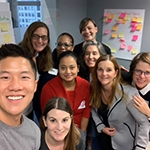
Amid the COVID-19 pandemic and urgent need for physical distancing, schools, organizations, and companies are scrambling to put the systems in place to allow for remote work. With this shift, some are even wondering whether operating virtually is more feasible – and, at times, optimal – than in-person after all. The future of work offers unparalleled opportunities: the world in which current youth will work professionally will likely be more digital, virtual, and gig-based than ever before.
As innovative companies seek to attract and leverage talent across multiple geographies and contexts, they must also evolve their organizational culture to sustain a diverse, distributed workforce. To get this move right, a group of remote organizations is considering the unique dynamics and challenges of operating virtually and developing the practices and infrastructure to support a high-functioning team. In particular, our collective experiences have taught us that virtual teams need to be more intentional in developing a culture of diversity, equity, and inclusion (DEI) to ensure the success of their teams. Continually improving DEI in the workplace is critical for an organization’s success, so virtual teams must “walk the talk,” regularly examining the challenges of remote work and improving practices to reduce workplace inequities, rather than exacerbate them.
However, there is a lack of knowledge and expertise around the intersection of DEI practices and the future of work. Much existing guidance around this intersection focuses on traditional, in-person workplaces, and resources that might exist do so behind paywalls or through costly consulting services, out of reach for small businesses and nonprofits in need of support. There are organizations tackling this issue, but much like other innovation efforts, their work is happening in isolation. The field needs open knowledge and communities to do remote DEI well.
After identifying this opportunity, a group of seven equity-driven K-12 education organizations came together in 2019 to create the Remote DEI Collective (RDC), a community of practice specifically focused on the challenges and key strategies for DEI work within fully or partially remote environments. Together, we’re tackling these key questions:
- What opportunities does remote culture offer to disrupt power dynamics? How might remote culture exacerbate inequities and white supremacy culture?
- How can organizations improve recruitment, hiring, and onboarding practices for remote roles that optimize for DEI?
- Considering the unique challenges of communicating virtually, how can teams intentionally build trust with limited in-person interactions?
Over the past year, we’ve collaboratively developed insights, tested strategies, and codified practices, and we’ve packaged our learnings into a Remote DEI Toolkit. Check it out at www.remotedei.org and be sure to get involved if you’re interested.
Remote DEI Collective:

